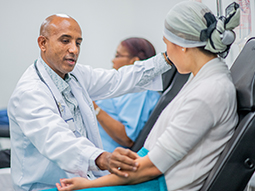Laryngeal cancers are malignant (cancerous) growths found in the larynx (voice box). Because of their location, they are highly treatable if caught early, with a cure rate of around 90 percent.
Risk factors
No one knows why cells grow out of control and form laryngeal tumors. There are certain risk factors, however:
-
Age (older than 40)
-
Gender (males have a higher risk)
-
History of smoking or heavy alcohol use
-
Family history of head and neck cancer
Symptoms
Symptoms of laryngeal cancer include:
-
Change in the sound of your voice
-
Pain while swallowing
-
Sore throat
-
Lump in your neck
-
Earaches
Other condition can also cause these symptoms, so it’s important to see a doctor right away.
Diagnosis
To make a diagnosis, our doctors:
- Take a full medical history
- Perform a complete head and neck exam
- Possibly remove a small amount of the tumor during a biopsy, for further study
- Potentially run lab and imaging tests, including:
-
X-ray
-
MRI
-
CT (CAT) scan
-
PET scan
-
Panendoscopy: direct laryngoscopy (look at voice box), esophagoscopy (esophagus), and bronchoscopy (bronchial tubes and lungs)
-
Laryngoscopy: examination of the larynx (voice box) with a laryngoscope
-
Endoscopy: inserting a flexible tube called a scope with a light and camera down the nose and throat
-
These exams and tests help the doctor determine:
-
The type of cancer and its stage
-
How aggressive it is
-
Whether it has spread
-
How best to treat it
Treatment
Treatment options for oral cancer depend on:
-
The cancer’s stage
-
The tumor’s size and location
-
The possible impact on your ability to eat, talk, and breathe
-
Whether the cancer has returned
-
Early-stage laryngeal cancers are usually treated with radiation, surgery, or a combination of the two. We also offer non-invasive, bloodless laser surgery for smaller tumors, leaving the option of full surgery available later, if needed
-
Advanced cancers are treated similarly, with the possibility of chemotherapy, either combined with radiation or with radiation and surgery. Receiving chemotherapy and radiation together can help patients avoid the removal of the voice box (laryngectomy)
We also offer clinical trials in radiation therapy, chemotherapy, and targeted therapy.
Reconstruction and rehab
While we try to avoid it, sometimes the best treatment is removing your voice box (a laryngectomy). If that happens, we offer the latest tools to restore your voice, as well as speech therapy.
Follow-up care
Patients who have had laryngeal cancer are at risk of developing a second head or neck cancer, and our doctors also want to catch any original cancer that might return (recur). After treatment, they will ask you to come in for regular checkups, as frequently as once a month for the first year.
Our providers

Expert Oncologists Care
Getting the care you need starts with seeing one of our oncologists.









